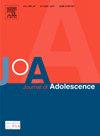Paternal and maternal psychological distress and adolescent health risk behaviors: The role of sensitive periods
Abstract
Introduction
Adolescent health risk behaviors are linked to poor physical and mental health outcomes. While past research shows that maternal psychological distress predicts those behaviors, we know less about the role of paternal psychological distress and the role of sensitive periods.
Methods
Using 11,128 data from families (50.5% female children) from the UK's Millennium Cohort Study, we examined the role of timing of exposure to paternal and maternal psychological distress in engagement in health risk behaviors (smoking, alcohol use, binge drinking, and sexual activity) at age 14. Paternal and maternal psychological distress, measured with the Kessler-6 scale, were assessed at child ages 3, 7, and 11. We performed path analysis, adjusting for key covariates, modeling maternal distress parallel to paternal, and allowing for autoregressive paths.
Results
Paternal distress experienced at age 11 predicted a higher likelihood of smoking at age 14. Maternal distress at age 7 also predicted a higher likelihood of smoking, alcohol use, and binge drinking, but only for boys. Moreover, maternal distress at age 3 was associated with a lower risk for alcohol use. Effects were not replicated in the sensitivity analysis we performed, including only families with resident biological fathers across the study period. Instead, maternal and paternal distress at age 11 raised girls' risk for binge drinking and sexual activity, respectively.
Conclusions
Parental distress in early childhood does not predict adolescent health risk behaviors. In late childhood, however, both paternal and maternal distress seem to influence the likelihood of engagement in such behaviors.


 求助内容:
求助内容: 应助结果提醒方式:
应助结果提醒方式:


